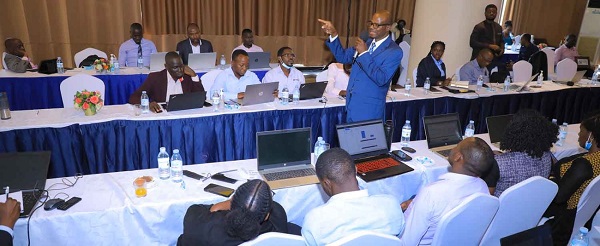KAMPALA– A new digital platform [ RASME ] will accelerate data collection in Uganda, which could greatly speed up project implementation.
RASME acronym of Remote Appraisal, Supervision, Monitoring and Evaluation in Uganda will improve the collection of project-related data in African Development Bank projects.
RASME is helpful for government officials, project implementing units, beneficiaries, development partners, and Bank operations staff because it makes it possible to collect data in the field, throughout the life-cycle of projects, using a smartphone, tablet, or laptop, in several digital formats, including text, images, figures, and videos.
“One of the challenges we face in Uganda in data collection is that, whereas data may be sent electronically to Bank staff, the data is only accessible to the recipient of the email, who can choose whether or not to share it with others. With RASME, once the data is collected and uploaded in the system, it will be accessible to anyone that has access to the system, irrespective of their location,” said Milly Chesire, the Principal Country Programme Officer in the Uganda office of the African Development Bank [AfDB].
A recent Independent Development Evaluation [IDEV] found that Bank projects in agriculture and water supply and sanitation had had positive economic returns, but cost overruns and delays were an issue in all sectors. The report, covering the 2011-2021 period, highlighted the challenges that remain in Uganda’s transport sector. In 2012, the country’s share of national paved roads stood at 16 percent. The Bank’s target was to increase that share to 25 percent by end-2021. The RASME initiative is hopefully a step in that direction.
RASME is a partnership between the AfDB’s IT department, the World Bank’s Geo-Enabling initiative for Monitoring and Supervision and the KoBoToolbox Foundation, a non-governmental organization affiliated with the Harvard Humanitarian Initiative.
The launch took place in the Ugandan capital, Kampala recently. It was conducted alongside a three-day training, attended by over 70 participants, comprising government representatives, project implementing units, and staff from the World Bank, and AfDB.
“The African Development Bank has projects spread across vast geographical regions in Uganda. So, the launch of RASME is truly a game-changer for us,” said Augustine Kpehe Ngafuan, the African Development Bank Country Manager for Uganda. “It will help us track the status of our projects across the country in just a few seconds, through both written and visual updates, thereby increasing the efficiency and effectiveness of our delivery.”
The RASME solution will also address travel restrictions brought on by the Covid-19 pandemic, which has limited site visits. It also caters for situations where conflict, lack of security, dangerous terrain or logistical constraints, make access by project experts impossible, difficult or limited.
Collins Ishimwe, Head of the Multilateral Section at the Uganda Ministry of Finance, Planning and Economic Development, said the geo-mapping aspects of RASME would give project profiles a much greater sense of life.
Martin Mugiri, Project Coordination Officer at the Kampala Capital City Authority, described RASME as user-friendly, saying that it would add value to their operations.
The African Development Bank is in the process of rolling out RASME across its country and regional offices, a deployment expected to enable Bank stakeholders to prepare projects more effectively, track their progress, and evaluate their impact on beneficiary communities in an open, transparent manner.
RASME is currently being implemented in 11 other African countries, namely Rwanda, Burundi, Tanzania, Ethiopia, Gabon, Cameroon, Chad, the Democratic Republic of Congo, the Central African Republic, Nigeria, and Mozambique.
https://thecooperator.news/afdb-approves-more-than-us1bln-for-emergency-food-production-plan/
Buy your copy of theCooperator magazine from one of our countrywide vending points or an e-copy on emag.thecooperator.news
